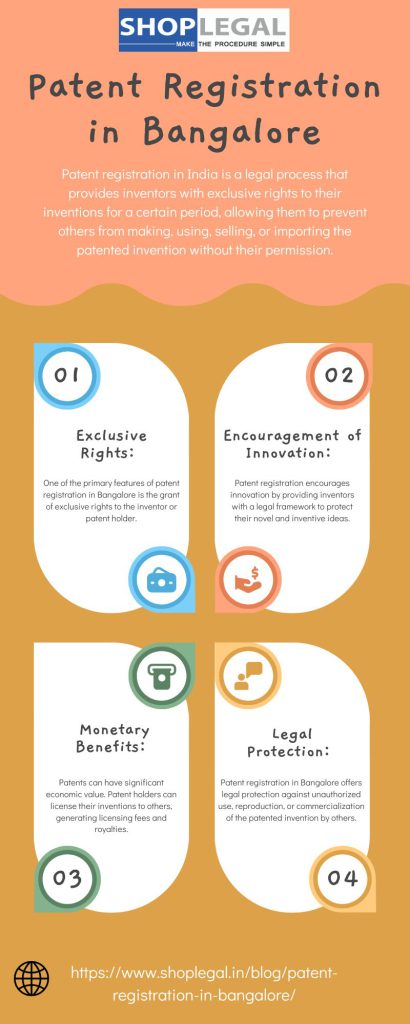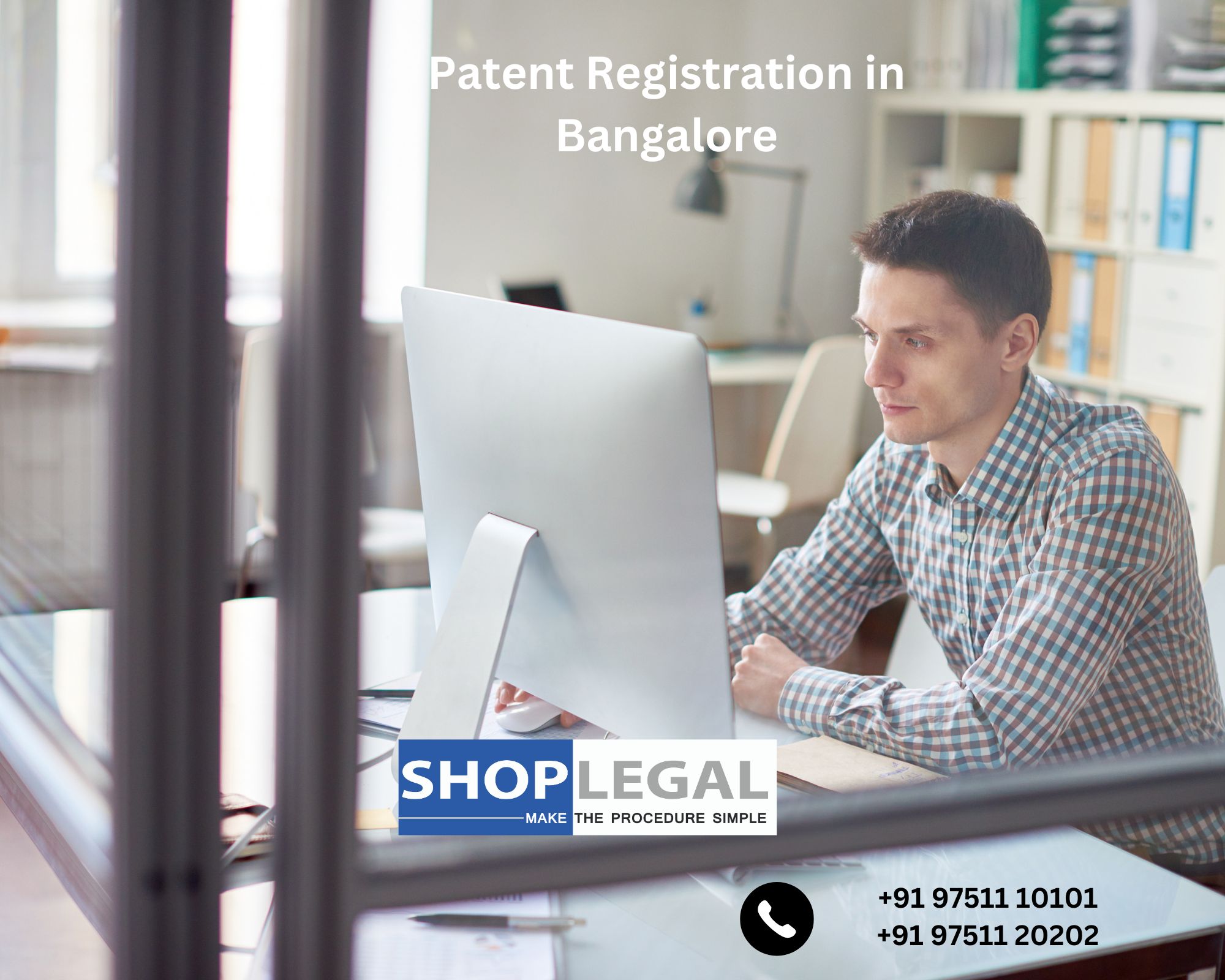Patent Registration in Bangalore
TALK TO EXPERTS
Patent registration in India is a legal process that provides inventors with exclusive rights to their inventions for a certain period, allowing them to prevent others from making, using, selling, or importing the patented invention without their permission.
This system encourages innovation by rewarding inventors and creators for their contributions to technology and society. The patent registration process in India is governed by the Indian Patents Act, 1970, and is administered by the Indian Patent Office under the Controller General of Patents, Designs, and Trademarks.
Features of Patent registration in Bangalore
Patent registration in India offers several features and benefits to inventors and innovators, promoting technological advancement and safeguarding their intellectual property rights.
Here are some key features of the patent registration process in India:
Exclusive Rights:
One of the primary features of patent registration in Bangalore is the grant of exclusive rights to the inventor or patent holder. This means that the inventor has the sole authority to make, use, sell, or license the patented invention for a specific period (usually 20 years from the filing date).
Encouragement of Innovation:
Patent registration encourages innovation by providing inventors with a legal framework to protect their novel and inventive ideas. The exclusive rights granted motivate inventors to invest time, effort, and resources into research and development, knowing that their efforts will be rewarded.
Monetary Benefits:
Patents can have significant economic value. Patent holders can license their inventions to others, generating licensing fees and royalties. They can also use their patents as assets to attract investors or secure funding for further research and development.
Legal Protection:
Patent registration in Bangalore offers legal protection against unauthorized use, reproduction, or commercialization of the patented invention by others. Patent holders have the right to take legal action against infringers and seek remedies such as damages, injunctions, and court orders.
Global Recognition:
A patent granted by the Indian Patent Office is recognized in India and provides protection within the country’s borders. However, inventors seeking international protection can also file for patents in other countries through mechanisms like the Patent Cooperation Treaty (PCT) or national filings.
Public Access to Information:
Once patents are granted after Patent registration in Bangalore, they are published in the public domain, contributing to the dissemination of knowledge and promoting further research and innovation. The information in patents can be used by researchers, students, and businesses for educational and research purposes.
Patentable Subject Matter:
The Indian Patents Act defines what is considered patentable subject matter, which includes processes, products, and improvements that are new, non-obvious, and capable of industrial application. However, certain categories such as mathematical methods, abstract theories, and certain business methods are not patentable.
Novelty Requirement:
To be eligible for a Patent registration in Bangalore, the invention must be novel, meaning it should not have been disclosed or published anywhere in the world before the filing date of the patent application. Conducting a novelty search before filing helps ensure that the invention meets this requirement.
Non-Obviousness:
The invention must also be non-obvious to a person skilled in the relevant field. This means that the invention should not be an obvious variation of existing technologies or common knowledge in the field.
Industrial Applicability:
The invention must be capable of being used or applied in an industrial process or for a practical purpose. It should not be purely theoretical or experimental.
Examination process:
Patent applications undergo a thorough examination process to assess their novelty, inventive step, and industrial applicability. The patent office issues an examination report, and the applicant has the opportunity to respond to objections and amend claims to secure a favorable outcome.
Who cannot apply for patent in India?
Basically, patent rights are regional in nature for example a patent is evaluated and conceded by the patent workplaces of every nation, and in this way a different application is to be recorded in every country/district in which the designer needs to get his privileges.
Regardless, in India, according to Section 134 of the Patents Act, any country that doesn’t accord to the occupants of India comparable freedoms in respect of the grant of Patents and the security of patent privileges as it accords to its own public, then, at that point, an individual of such nation can’t have any significant bearing for a Patent registration in Bangalore.
Further a mandatory written permission must be gotten from the Indian Patent Office for filing in outside nations.
Be that as it may, assuming one first documents a patent application in Quite a while the Initial public offering defers off the compulsory necessity permitting Indian occupants to record a patent application outside India for a development following a month and a half of filing the application in India straightforwardly.
What are the 5 requirements of a patent?
To be granted a patent, an invention must meet specific criteria to ensure that it is both novel and valuable to society. These criteria vary across jurisdictions, but generally, there are five fundamental requirements that an invention must satisfy to be eligible for patent protection:
Novelty:
One of the core requirements for obtaining a patent is that the invention must be novel. This means that the invention must be new and not previously disclosed to the public through any means, including publications, public demonstrations, or prior patents.
The novelty requirement for Patent registration in Bangalore ensures that patents are granted for truly innovative and original ideas that contribute to the advancement of knowledge and technology.
Non-Obviousness (Inventive Step):
An invention must have an inventive step or non-obviousness. This means that the invention should not be obvious to a person skilled in the relevant field of technology. In other words, it should not be something that would be readily deduced by someone with ordinary skill and knowledge in the field.
The non-obviousness requirement ensures that patents are granted for inventions that represent a significant leap beyond the existing state of the art.
Industrial Applicability:
For an invention to be eligible for patent protection, it must have industrial applicability. This means that the invention should be capable of being made or used in some kind of industry, including agriculture, manufacturing, or services.
The requirement of industrial applicability ensures that patents are granted for inventions that have practical utility and can be put to use for the benefit of society.
Enablement (Sufficiency of Disclosure):
The patent application for Patent registration in Bangalore must provide sufficient information to enable a person skilled in the relevant field to make and use the invention without undue experimentation. This requirement ensures that the invention is disclosed in a manner that allows others to understand and replicate it.
The enablement requirement promotes transparency and knowledge dissemination, as the purpose of patents is not just to grant exclusive rights but also to share technical information.
Utility:
An invention must have utility, meaning it should serve a useful purpose or function. The utility requirement ensures that patents are not granted for frivolous or purely theoretical inventions. While the utility standard is generally not very stringent, inventions that lack any practical application or use may not meet this requirement.
Meeting these five requirements demonstrates the novelty, inventiveness, practicality, and transparency of an invention, making it deserving of Patent registration in Bangalore. These criteria help strike a balance between granting exclusive rights to inventors as an incentive for innovation and ensuring that patents contribute to the progress of technology and society.
It’s important to note that the specifics of these requirements can vary slightly from jurisdiction to jurisdiction, so it’s recommended to consult with a patent professional or legal expert when preparing a patent application to ensure compliance with the relevant laws and regulations.
About Us
Shoplegal is the best service provider. We offer services at an affordable cost.








